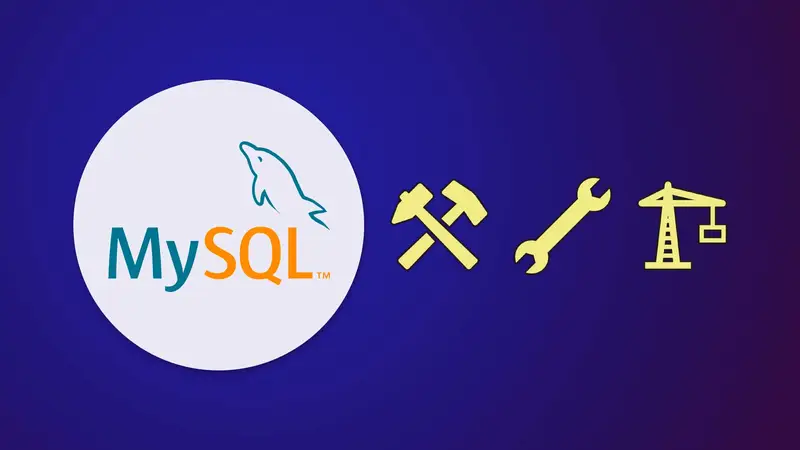MySQL 8
Data is the most valuable asset of the digital age.
Websites, applications, and enterprise software require a powerful and reliable database management system to handle data effectively. This is where MySQL stands out as one of the most popular open-source relational database management systems (RDBMS) for many years. Especially with version 8.0, MySQL offers a structure that is significantly more powerful, faster, and more secure than its predecessors.

What is MySQL 8?
MySQL 8 is an open-source relational database management system (RDBMS) developed by Oracle. Based on the SQL (Structured Query Language) standard, it is actively used on millions of systems worldwide. The 8.0 version brings substantial improvements and new features in performance, security, and flexibility compared to previous versions.
Key Features of MySQL 8
1. Advanced JSON Support
MySQL 8 provides enhanced functions for the semi-structured JSON data type. Storing, searching, and filtering JSON data is now faster and more flexible than in earlier versions.
2. View and Functional Enhancements
The new version introduces support for window functions, Common Table Expressions (CTEs), and role-based access controls, making SQL queries more powerful and readable.
3. Automatic Re-indexing and Optimization
MySQL 8 features smarter data indexing. The enhanced InnoDB engine performs automatic optimizations based on frequently accessed data, improving performance.
4. UTF-8 Default Character Set
While older versions used latin1 as the default character set, MySQL 8 defaults to utf8mb4, offering full Unicode support. This eliminates character encoding issues in multilingual content.
5. Security Improvements
Advanced encryption protocols
SHA-2 based password algorithms
More detailed configuration options for user access controls
These features significantly enhance data security in MySQL 8.
6. Performance Enhancements in Indexing and Table Operations
MySQL 8 offers considerable improvements in indexing, efficient JOIN operations, and query optimization—especially beneficial for handling large datasets.
Advantages of MySQL 8
✅ Free and Open Source
The community edition is entirely free. Being open source allows developers and system administrators to customize it as needed.
✅ High Performance
The optimized query engine ensures high-speed data processing, even with large datasets.
✅ Extensive Ecosystem
Compatible with PHP, Python, Java, Node.js, and many other programming languages. It is also the preferred database engine for CMS platforms like WordPress, Drupal, and Magento.
✅ User-Friendly Management Tools
GUI tools like MySQL Workbench help visualize database structures, run queries, and perform backups with ease.
✅ Cloud and Server Compatibility
MySQL 8 is supported on major cloud platforms such as Amazon RDS, Google Cloud SQL, and Microsoft Azure.
Where is MySQL 8 Used?
Web Applications
Works seamlessly with PHP-based content management systems like WordPress, Joomla, and Laravel.Mobile App Backends
Used for data storage and querying in backend systems for mobile applications.Enterprise Applications
Provides a secure and high-performance infrastructure for systems like ERP, CRM, inventory management, and customer databases.Data Analytics and Reporting
MySQL is used in data mining and business intelligence systems thanks to its strong query performance.
How to Install MySQL 8
On Linux (Ubuntu/Debian)
sudo apt update
sudo apt install mysql-server
sudo mysql_secure_installation
On Windows
Download the Windows Installer from the official MySQL website.
Follow the installation wizard to complete setup.
Configure your database via MySQL Workbench or the command line.
Frequently Asked Questions (FAQ)
Is MySQL 8 free?
Yes, the Community Edition is completely free. Oracle also offers an Enterprise Edition with additional security and support services.
Which systems is MySQL 8 compatible with?
It runs on Linux, Windows, macOS, and cloud platforms. It is especially easy to install on systems like Ubuntu, CentOS, and AlmaLinux.
What are the differences between MySQL 5.7 and MySQL 8?
MySQL 8 offers significant improvements in performance, security, JSON support, query processing, and Unicode character handling.
Conclusion
MySQL 8 is a powerful, flexible, and reliable database solution suitable for both individual developers and enterprise-level projects. With its open-source nature, high performance, advanced security features, and broad integration support, it has become an essential part of modern software development.
Whether for web projects, mobile applications, e-commerce platforms, or data analytics, MySQL 8 is a trusted choice. If you’re looking for a robust database infrastructure, MySQL 8 could be the right fit for you.
